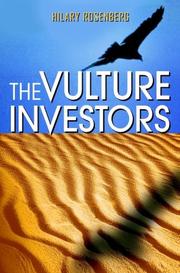Check nearby libraries
Buy this book

If debt was the fool's paradise of the eighties, then bankruptcy became the bitter reality of the early nineties. Every day, it seemed, the headlines trumpeted another famous company declaring bankruptcy. And feasting on the corporate wreckage was a growing breed of scavengers--the vulture investors. Seeing riches in the ruins, they bought up bonds, bank loans, and other types of debt at cheap prices. Some even acquired control of companies that were coming out of Chapter 11, gambling that the future would prove to be much brighter than the past.
Painstakingly reported and full of behind-the-scenes stories borne out by dozens of personal interviews, The Vulture Investors takes us inside the risky--and rewarding--world of investing in distressed companies by chronicling the major bankruptcy cases of our time. We meet the people who have learned how to profit from the troubles of others, and see close up how they combine scrutiny of value with strategy in their endeavors to spin gold from the corporate rag pile. And we experience the intricacies, loopholes, and pitfalls of the complex web of bankruptcy laws they have mastered to help orchestrate financial restructurings that will most benefit them. Among the colorful characters we meet: Marty Whitman, a crusty veteran vulture who reaped great gains in the bankruptcy reorganizations of Southland and Public Service Company of New Hampshire. Carl Icahn, the former corporate raider who invested in the busted bonds of such companies as Southland and Trump Taj Mahal.
Leon Black, the former junk-bond corporate finance chief at Drexel, Burnham, Lambert & Co., who influenced the bankruptcy reorganizations of Harcourt Brace Jovanovich, Gillett, and others. Sam Zell, the "Grave Dancer," who raised more than $1 billion to take ownership stakes in needy companies like department store operator Carter Hawley Hale. Paul Kazarian and Michael Lederman of Japonica Partners, who engineered the first hostile takeover in bankruptcy in the case of Allegheny International. Ron LaBow, a longtime vulture investor who bought the bank debt of Wheeling-Pittsburgh Steel and ended up owning the company.
Today, even as the economy slowly recovers, these men and others continue to partake in one of the most brutal forms of investing, clashing with the managements of sinking companies and with creditors and shareholders who are desperate to survive without taking severe losses. But the vulture investors revel in the challenge that bankruptcy presents. And often, as the stories of bankruptcy herein illustrate, they and their money play the key role in bringing a company back from the dead.
Check nearby libraries
Buy this book

Previews available in: English
Subjects
United States, Leveraged buyouts, Business failures, Bankruptcy, VulturesPlaces
United States| Edition | Availability |
|---|---|
| 1 |
aaaa
|
|
2
The Vulture Investors: The Winners and Losers of the Great American Bankruptcy Feeding Frenzy
July 1993, Harpercollins
Paperback
in English
0887306489 9780887306488
|
zzzz
|
|
3
The vulture investors: the winners and losers of the great American bankruptcy feeding frenzy
1992, HarperBusiness
in English
- 1st ed.
0887305555 9780887305559
|
zzzz
|
Book Details
Edition Notes
Includes bibliographical references (p. 343-392) and index.
"Revised edition"--P. vii.
Classifications
The Physical Object
Edition Identifiers
Work Identifiers
Source records
Better World Books recordLibrary of Congress MARC record
Internet Archive item record
marc_nuls MARC record
First Sentence
"On a clear afternoon in May 1986, Michael Price boarded a Lexington Avenue subway near his office in lower Manhattan and rode uptown to the electric razor-topped Citicorp Center."
Community Reviews (0)
History
- Created April 1, 2008
- 12 revisions
Wikipedia citation
×CloseCopy and paste this code into your Wikipedia page. Need help?
| March 7, 2023 | Edited by MARC Bot | import existing book |
| October 5, 2021 | Edited by ImportBot | import existing book |
| May 9, 2021 | Edited by ImportBot | import existing book |
| September 13, 2020 | Edited by MARC Bot | import existing book |
| April 1, 2008 | Created by an anonymous user | Imported from Scriblio MARC record |










